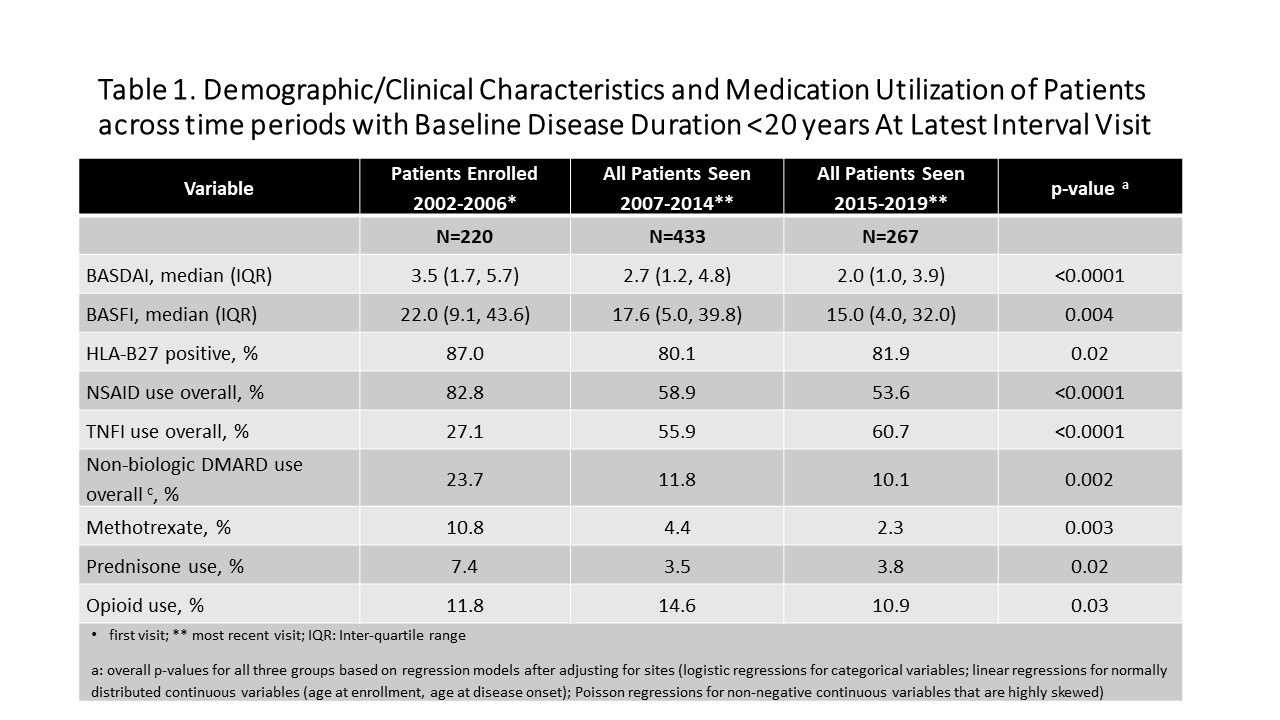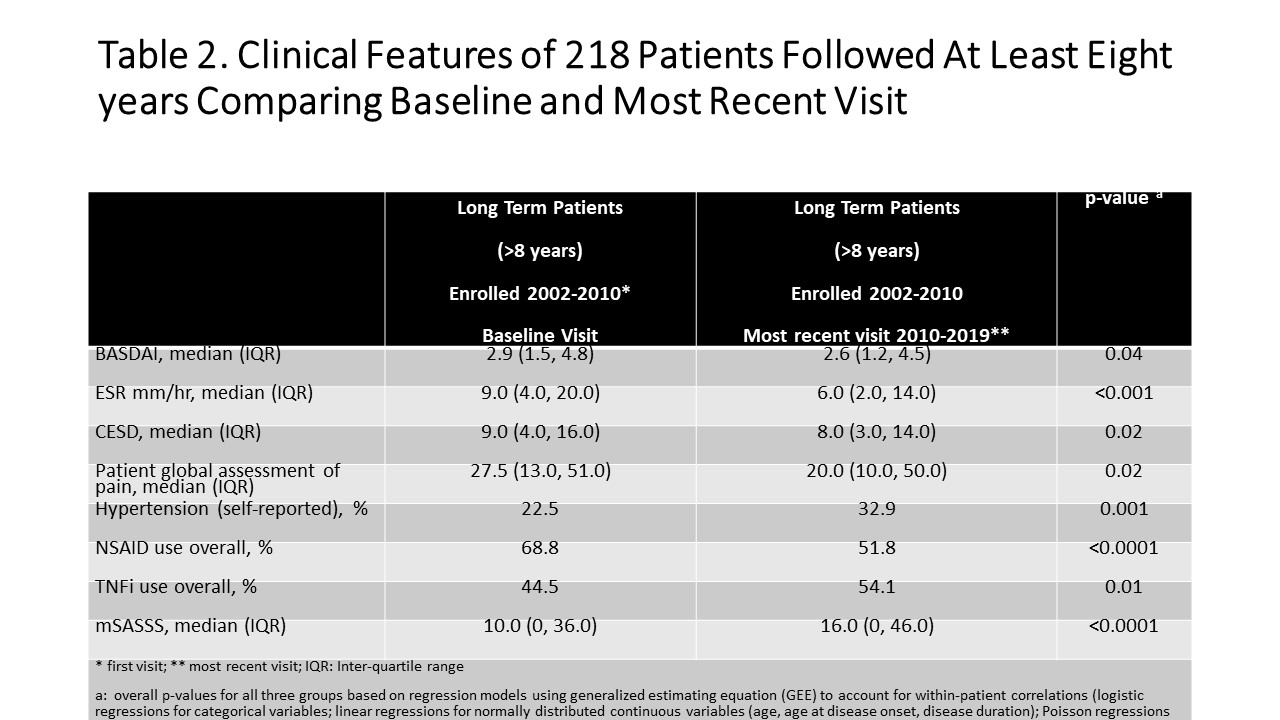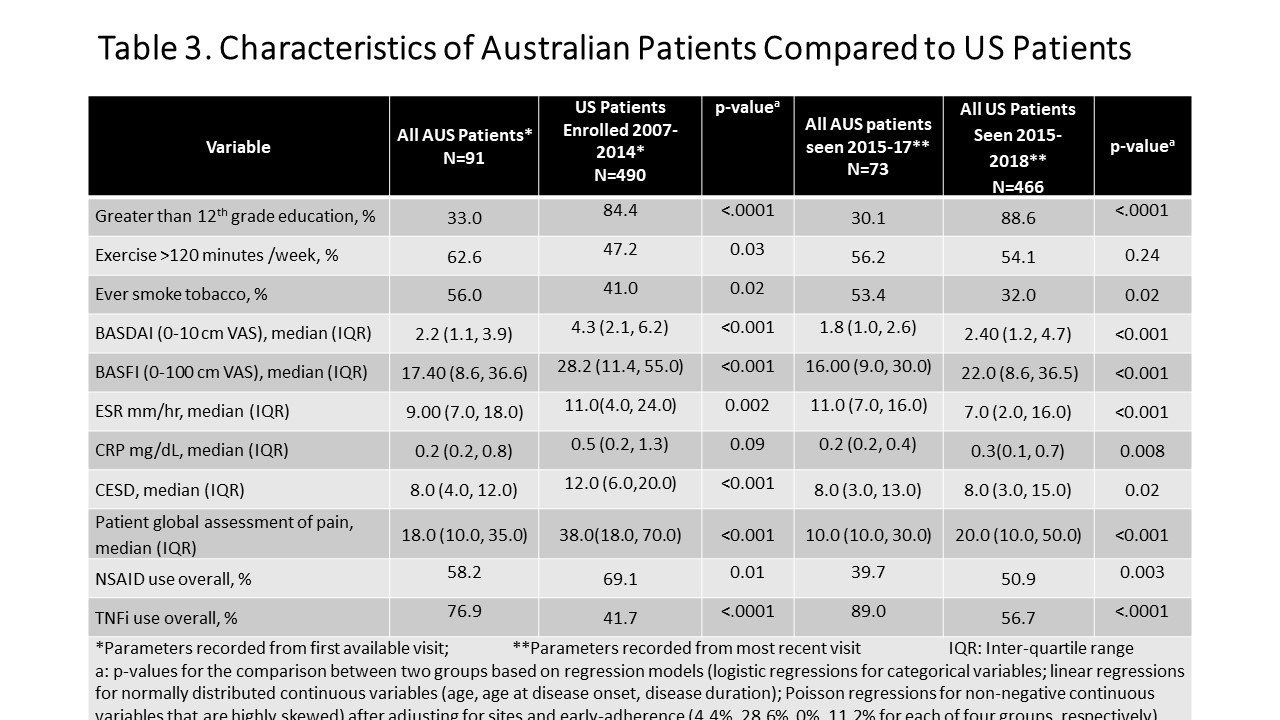Session Information
Date: Monday, November 9, 2020
Session Type: Poster Session D
Session Time: 9:00AM-11:00AM
Background/Purpose:
To compare disease characteristics, comorbidities, and medication utilization of 573 patients with ankylosing spondylitis (AS) with short (< 20 years) disease duration (from symptom onset) and 568 patients with long disease duration ( > 20 years) enrolled in the Prospective Study of Outcomes in AS (PSOAS)/Australo-Anglo-American (TASC) study over three different periods of time (2003-2006, 2007-2015, 2015-2019) and followed longitudinally.
Methods:
Study visits were carried out every 6 months examining disease activity (Bath AS Disease Activity Index (BASDAI), C-reactive protein, erythrocyte sedimentation rate), functional impairment, depression, and medication utilization as well as clinical assessments of joint and entheseal involvement as well as spinal mobility and radiographic severity. Groups were compared with regression models using generalized estimating equation, linear and Poisson regressions after adjusting for sites and for patients withdrawing from the study at less than two years follow-up.
Results: Looking at those 573 U.S. patients with short disease duration (< 20 years), NSAID and non-biologic DMARD (particularly methotrexate) and prednisone use decreased over time and TNFi use rose between the initial period of enrollment (2002-2006) and the last period (2015-2019) (Table 1). During the middle period of the study (2007-2014) there was a slightly higher frequency of cardiovascular disease and opioid use that fell in the latest period of the study. No differences were seen over time in marital status, education level, frequency of exercising or either comorbidities associated with AS such as uveitis or psoriasis or comorbidities not directly disease related such as diabetes or osteoporosis (data not shown). Looking at those 568 U.S. patients with longer disease duration ( >20 years), there was a fall in functional impairment, current smoking rates and NSAID use comparing the initial study visits as well as the most recent study visits over the three phases of the study (data not shown). Disease activity, depression scores and NSAID use decreased and anti-TNF use increased between baseline and last followup visits in those followed > 8 years despite an increase in mSASSS scores over time (Table 2). The 91 Australian patients enrolled were more likely to be white (100% versus 74.3% of US patients, p< 0.00001), had lower disease activity (BASDAI, ESR, CRP), functional impairment and depression scores, and less NSAID and much more TNF inhibitor usage (Table 3) and secukinumab usage (4.1% vs 2.2% of US patients), despite having lower educational levels and a higher frequency of smoking.
Conclusion:
Patients with AS enrolling in this multicenter longitudinal cohort have improved disease profiles and different medication utilization over time, including gr perhaps reflecting innovations in treatment and increasing disease awareness. The improved disease parameters seen in the Australian patients may be due to the much higher use of TNF blockers provided from their National Health Care Service compensating for other bad prognostic factors in this cohort (smoking, lower educational status).
 Table 1. Demographic/Clinical Characteristics and Medication Utilization of Patients Across Time Periods with Baseline Disease Duration < 20 years At Latest Interval Visit
Table 1. Demographic/Clinical Characteristics and Medication Utilization of Patients Across Time Periods with Baseline Disease Duration < 20 years At Latest Interval Visit
 Table 2. Clinical Features of 218 Patients Followed At Least Eight years Comparing Baseline and Most Recent Visit
Table 2. Clinical Features of 218 Patients Followed At Least Eight years Comparing Baseline and Most Recent Visit
 Table 3. Characteristics of Australian Patients Compared to US Patients
Table 3. Characteristics of Australian Patients Compared to US Patients
To cite this abstract in AMA style:
Ridley L, Weisman M, Gensler L, Ward M, Hwang M, Tahanan A, Lee M, Rahbar M, Ishimori M, Brown M, Reveille J. The Changing Profile of Ankylosing Spondylitis in the Biologic Era [abstract]. Arthritis Rheumatol. 2020; 72 (suppl 10). https://acrabstracts.org/abstract/the-changing-profile-of-ankylosing-spondylitis-in-the-biologic-era/. Accessed .« Back to ACR Convergence 2020
ACR Meeting Abstracts - https://acrabstracts.org/abstract/the-changing-profile-of-ankylosing-spondylitis-in-the-biologic-era/
